UK Banks Facilitated Covert Movement Of Funds For Sanctioned Iranian Firm

Iran utilized two major UK banks to clandestinely transfer funds globally as part of an extensive sanctions-evasion plot.

Iran utilized two major UK banks to clandestinely transfer funds globally as part of an extensive sanctions-evasion plot.
The state-controlled Petrochemical Commercial Company (PCC), a central figure in the scheme, is accused by the US of raising substantial sums for the Iranian Revolutionary Guards Quds Force and collaborating with Russian intelligence to fund Iranian proxy militias. Both PCC and its UK subsidiary, PCC UK, have been subject to US sanctions since November 2018.
Recent disclosures about the sanctions-evasion operation in the heart of London, emerge following the Royal Air Force's participation in US airstrikes against Iranian-backed Houthi rebels in Yemen. Additionally, both the UK and US have imposed sanctions on what they describe as a "transnational assassinations network" overseen by Iranian intelligence, targeting activists and dissidents, including British residents.
Financial documents scrutinized by the Financial Times indicate that PCC, following its sanctioning by the US, utilized UK-based entities to receive funds from Iranian fronts in China, concealing their true ownership through trustee agreements and nominee directors.
European banks found complicit in breaching US sanctions on Iran have faced significant penalties, with Standard Chartered and UniCredit paying over $1 billion each in fines in 2019.

The Mayor of Tehran revealed that significant agreements for investment and construction projects have been reached with Chinese entities following his recent trip to China.
On Sunday, Alireza Zakani made the announcement during a session of the Tehran City Council, providing a detailed report on his October visit to China, stating three contracts have been signed in phase one of the deals.
The agreements included the purchase of 751 railway wagons, one million vans, motorcycles, and buses, as well as the construction of metro line 11.
He also announced plans for the construction of hotels, buildings, amusement parks, and water parks within Tehran. He outlined, "We have finalized agreements to develop five five-star hotels in collaboration with Chinese companies, industrialize 200,000 housing units, and establish two amusement parks and two water parks in Tehran."
In January, Hamidreza Saremi, the Deputy Mayor of Tehran, revealed discussions regarding the Chinese Housing Construction plan, stating, "We have initiated negotiations with Chinese developers, leading to the allocation of parcels of land exceeding one hectare in size in the southern regions of the city."
During his campaign, President Ebrahim Raisi pledged to build one million housing units annually. However, housing market experts and politicians have criticized this commitment as "impractical." The average price of one square meter of housing in Tehran stands at approximately 600 million rials ($1,200), significantly surpassing the monthly minimum wage of around $120 (excluding benefits).
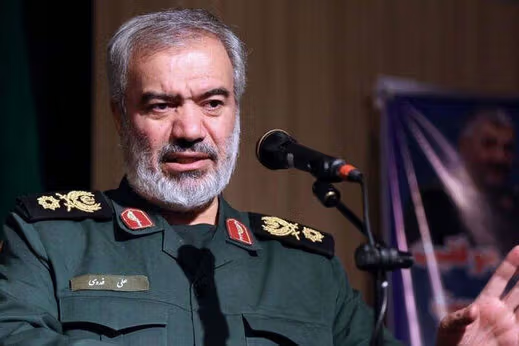
The United States did not even fire a shot at Iran, the deputy commander of the IRGC said Sunday, after Washington launched air strikes at Iran-linked military targets in Iraq and Syria on Friday.
Referring to the United States in the customary jargon of the Iranian regime, Ali Fadavi stated, "The united front of arrogance conspires against us, and at no point has such enmity been recorded against a nation, and these enemies themselves admit defeat, and in military matters, they have not even fired a single arrow toward this country.”
The Biden administration vowed retaliation after a drone launched by Iran-backed militia forces from Iraq hit a US military outpost in Jordan on January 28 killing three soldiers and wounding around 40 others. However, it took the administration more than five days to launch a series of air strikes against Iranian proxy forces in Iraq and Syria, giving ample time to key Iranian and allied personnel to vacate dangerous locations.
US officials indicated that they do not want to attack Iran directly and aim to prevent an escalation. Following the belated attack on proxies, Iranian officials got over the initial fear of ‘American wrath’, confident that there would be no attacks on targets inside Iran.
Fadavi also emphasized that Iran’s efforts against Israel were key to raise opposition to the Jewish state around the world. “Imam Khomeini called Israel a cancer in the region,” he highlighted, referring to the founder of the Islamic Republic.
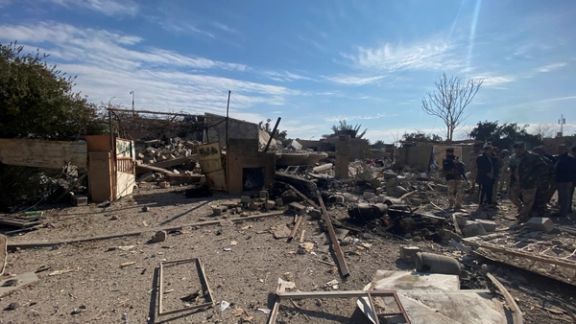
Several members of US Congress on Sunday slammed President Joe Biden for his failure to directly confront Iran even after its proxies killed three American soldiers in Jordan.
President Biden authorized airstrikes on dozens of targets in Syria and Iraq last Friday, five days after a drone attack on US base Tower 22 in Jordan by Iran-allied Kataeb Hezbollah. US officials announced that the strikes were the first in a series of retaliatory attacks against Iran’s Revolutionary Guards, aiming at degenerating their capacity to attack US troops and interests.
Not long after the airstrikes, however, IRGC announced that it had no personnel or interests in the targeted locations, raising suspicions that the delay in US military response had been a leeway for the Iranians to take out their forces.
“They keep saying that they want to retaliate, but then they say it’s about deterrence, then they say it’s about diminishing capabilities,” House Intelligence Chair Mike Turner said in an interview with CBS. “Those are all different goals and objectives. And they’re not doing any of those.”
“The administration has no policy with respect to Iran,” he added, “ how to diminish their capability, diminish these attacks and diminish their nefarious activities in the Middle East.”
Turner was by no means alone. All through the weekend, US Senators and Representatives appeared on major TV networks to discuss the crisis in the Middle East. And many were critical of the Biden administration and its responses to the loss of American lives.
“What we need to be doing right now is turning up the heat on Iran,” House Speaker Mike Johnson said on NBC, “we need to decimate Iran’s central bank…, we need to put maximum pressure on their oil exports. There’s a lot that we could do to Iran instead of this appeasement strategy.”
“We need to make clear to Iran that nothing is off the table,” Johnson said.
Reports coming from Iran seem to suggest that the regime has gotten over the initial fear of ‘American wrath’, presuming that there would be no attacks on targets inside Iran. Deputy commander of the IRGC, Ali Fadavi, said on Sunday that "not even one bullet was fired at Iran," calling US efforts to deter Iran a failure. The country’s military has even taken the opportunity to threaten the US.
Iran’s Army on Sunday issued a rare warning over its cargo ships Behshad and Saviz, which are thought to be helping the Houthis target commercial vessels in the Red Sea.
“Those engaging in terrorist activities against Behshad or similar vessels jeopardize international maritime routes, security and assume global responsibility for potential future international risks,” the video statement said.
Both Iran and the US say they’re not interested in going to war. But Biden’s national security advisor Jake Sullivan was not willing Sunday to exclude the option of an attack inside Iran. “I’m not going to get into what’s on the table and off the table, when it comes to the American response,” he said when asked by an NBC presenter about targets inside Iran.
Some experts say that with the large-scale attack on Iran-affiliated targets in Iraq and Syria, the Biden administration has taken the penultimate step and would have no choice but to hit the interests of the Iranian regime, if further attacks are launched against American troops.
If markets in Iran are any measure to go by, the general feeling in the country is that that is not going to happen. The currency (rial) regained much of what it had lost against the US dollar in anticipation of the US offensive last week. Senior regime officials also seem to have regained their confidence, as seen in the propaganda video by Iran’s Army.
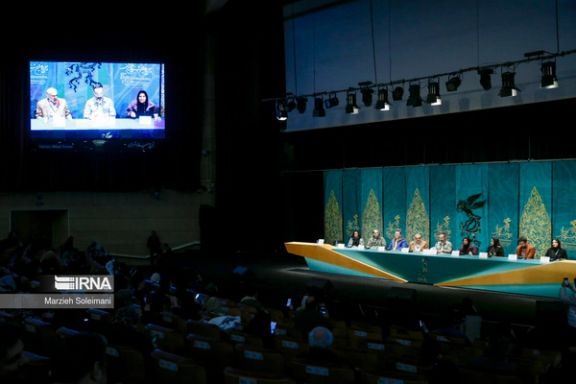
The Fajr Film Festival, once the Islamic Republic's most prominent annual cultural event, has caused embarrassment for the regime, its officials, and supporters this year.
According to reports, Iran's best-known filmmakers refused to attend the opening gala, critics criticized the organizers for their poor programming, and artists confronted officials for various reasons. The festival has become a political tool in the hands of hardliners to punish independent filmmakers and promote their loyalists.
Elnaz Shakerdoost, an actress who received awards in previous years, purchased a ticket last week to attend the festival movie house in Tehran where her new film, “Without A Body,” was being screened since she was not even invited to the opening ceremony. Shakerdoost decided to take the stage and address the audience about censorship.
The actress, considered a superstar, had been barred from official ceremonies due to her support of the 2022 protests in Iran and her advocacy for Iranian women defying compulsory hijab. She managed to make her way to the stage at the end of her movie and declare, "This is not a festival; this is a cultural war." As officials raised the music volume to drown out her speech, she added, "The officials screen the films they cannot find a reason to ban in the 'new look' section and effectively bury the movies alive forever."
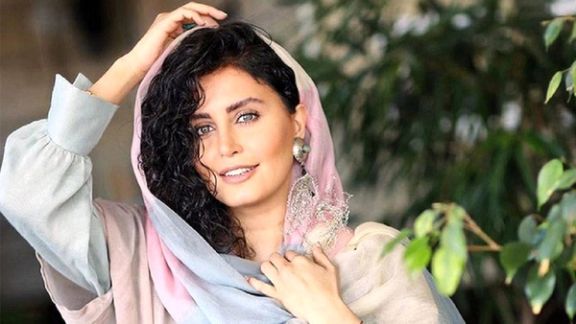
The festival this year, decided to pay tribute to director Parviz Sheikh-Tadi, known for making movies in support of the regime’s ideology. He is best known for his film, “Saturday Hunter,” full of conspiracy theories about Zionists controlling the world. Culture Minister Mohammad Mehdi Esmaili and two of the festival's officials ushered him to the stage, believing in his revolutionary credentials, unaware of any potential change in his views over the years.
Onstage, Sheikh-Tadi presented a tie as a gift to the Minister to make him appear tidy and serious, highlighting that hardliners in Iran used to cut people's ties, viewing them as a symbol of Western civilization. To embarrass the officials further, he took out a woman's headscarf and stated that it was futile to force women to wear it. The audience gave him a standing ovation, and the officials wore forced smiles, worried about what might happen next. The audience applauded every word Sheikh-Tadi uttered during his powerful protest act.
One film critic commented, "The videos and pictures of the event went viral, offering a valuable lesson for the officials. However, based on experience, we shouldn't be too optimistic." He pointed out that Sheikh Tadi shared political affiliations with the officials, making his message particularly impactful. "Who else should have told them what they needed to hear?"
Yet another embarrassment came as Asghar Naimi, a filmmaker and a former journalist tried to enter the festival's venue to watch his film, “Two days Later,” with the audience. The festivals officials and the organizers' representatives did not recognize him and violently tried to stop him. Naimi, a strong man, forcefully made his way inside while chastising the officials, who seemed clueless about the festival's essence.
Naimi later commented that "those who fund the movies through connections with the state should stop ignoring Iran's independent cinema."
Even during its best periods under President Mohammad Khatami's reformist government (1997-2005), the Fajr Film Festival, dedicated to paying tribute to the 1979 Islamic revolution, remained a caricature of the pre-revolution Tehran International Film Festival, which showcased the best of Iranian and world cinema and attracted giants from the global film industry.
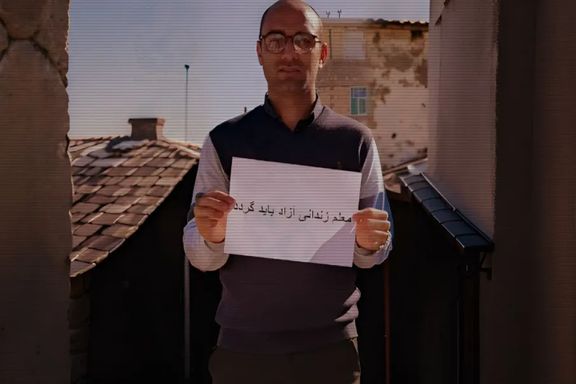
An administrative court has upheld the decision to expel Mohammad Saeidi Abou-Es’haqi, an Iranian teacher activist, from his position, amid sustained action to punish dissidents.
Abou-Es’haqi, an active member of the Lordegan Teachers' Union, was initially removed from his job in May 2023.
Abou-Es’haqi's expulsion was attributed to his active involvement in the 2022 anti-government protests, his solidarity with the families of government victims, and his artistic expressions through music and singing in sympathy with the protesters, alongside his participation in teachers' protests.
Iran's hardliners who control the parliament and the executive branch have been systematically replacing professional teachers and university professors with clerics and loyalists in the past one year.
Following the eruption of anti-regime protests in September 2022, security forces have been implicated in the deaths of more than 500 civilians, with hundreds more suffering severe injuries.
Numerous young protesters were also targeted with shotgun pellets, resulting in the loss of one or both eyes. Additionally, the regime detained approximately 22,000, encompassing journalists and hundreds of minors, in a widespread crackdown on dissent.
Iranian teachers have long been advocating for higher wages and pensions, highlighting their status as one of the lowest-paid classes of government employees.